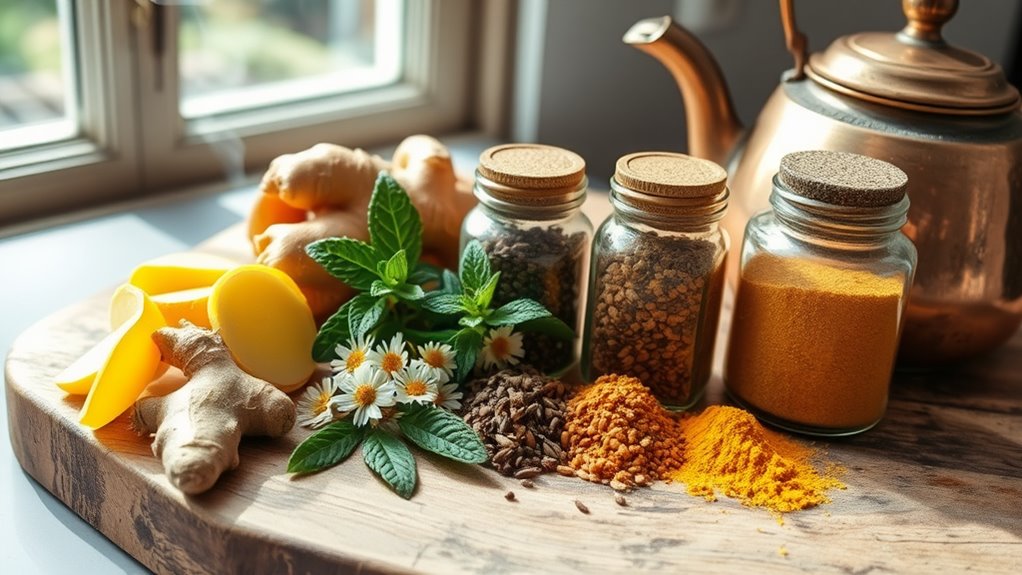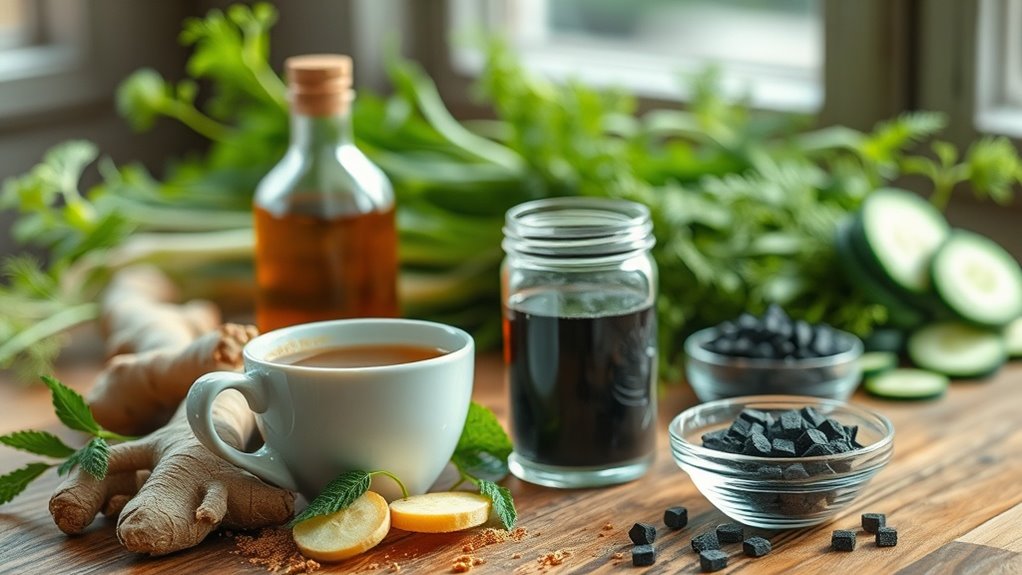Natural Remedies That Actually Work for Bloating and Gas
You can effectively combat bloating and gas with proven natural remedies that target digestive discomfort at its source. Start by sipping peppermint, ginger, or fennel tea 15-30 minutes after meals to reduce intestinal pressure and speed up gastric emptying. Implement mindful eating practices by chewing thoroughly and avoiding trigger foods like carbonated drinks. Light exercise, such as a 10-minute walk after meals, helps stimulate digestion. Understanding your body’s specific triggers will reveal additional effective solutions.
Understanding the Root Causes of Bloating and Gas
Understanding why bloating and gas occur is essential for finding effective solutions. Your digestive system produces gas when bacteria ferment undigested food in your intestines.
Common triggers include swallowing air while eating, consuming certain carbohydrates, and having food intolerances.
Before trying bloated belly remedies, identify specific foods that cause your symptoms.
Medical conditions like IBS, celiac disease, and SIBO can also lead to chronic bloating.
Hormonal changes, stress, and certain medications may worsen gas production.
Keeping a food diary and noting symptom patterns will help you pinpoint personal triggers and choose targeted natural treatments. Additionally, the role of gut bacteria in digestive health is crucial, as an imbalance can contribute to bloating and discomfort.
Powerful Herbal Teas for Digestive Relief
Looking for quick relief from digestive discomfort? Several research-backed herbal teas can help alleviate bloating and gas naturally.
Peppermint tea relaxes your digestive muscles and reduces abdominal pressure, while ginger tea contains compounds that speed up gastric emptying.
Chamomile tea’s anti-inflammatory properties help calm digestive distress, and fennel tea‘s natural compounds reduce intestinal gas.
For maximum benefit, steep your tea for 5-10 minutes and drink it 15-30 minutes after meals. You’ll find the most relief by choosing organic, loose-leaf varieties and avoiding added sweeteners.
These teas work best when combined with proper eating habits and stress management, as mindful eating practices can significantly enhance digestive health and reduce bloating.
Essential Lifestyle Changes for Better Digestion
Making targeted lifestyle adjustments can greatly reduce bloating and digestive issues.
Start by eating slowly and chewing thoroughly to minimize air intake and support proper digestion.
Avoid common triggers like carbonated drinks, chewing gum, and eating while stressed.
Schedule meals at consistent times to regulate gut motility.
Regular exercise, particularly walking after meals, helps stimulate digestion and reduce gas buildup.
Maintain proper posture while eating, and don’t lie down immediately after meals.
Track your food intake to identify personal triggers, and practice mindful eating without distractions.
Stay hydrated throughout the day, but limit fluids during meals. Additionally, incorporating gentle abdominal massage can further aid in releasing trapped gas and promoting digestion.
Kitchen Ingredients That Combat Digestive Issues
Beyond lifestyle modifications, your kitchen likely contains powerful natural remedies for digestive discomfort.
Clinical studies have demonstrated the effectiveness of common ingredients in reducing bloating and gas.
-
Ginger root contains active compounds called gingerols that accelerate gastric emptying and reduce intestinal inflammation.
-
Peppermint’s menthol relaxes the smooth muscles of your digestive tract, alleviating trapped gas and bloating.
-
Fennel seeds provide anethole, a compound that functions as an antispasmodic agent, helping to decrease abdominal distention.
These evidence-backed ingredients can be consumed as teas, added to meals, or taken in supplement form for best results. Additionally, incorporating ginger and lemon into your routine can enhance digestive health and reduce bloating.
Proven Exercise Techniques to Reduce Bloating
You’ll find significant relief from bloating through targeted physical activities that promote healthy digestion and gas release.
Research shows that gentle movements like yoga poses, particularly the wind-relieving pose and child’s pose, can help massage your digestive organs and encourage the expulsion of trapped gas.
Taking a 10-15 minute walk after large meals, combined with regular core-strengthening exercises, will improve your abdominal muscle tone and enhance your body’s natural digestive processes. Additionally, engaging in gentle exercises can stimulate gut motility, further aiding digestion and reducing discomfort.
Yoga Poses for Relief
Gentle yoga poses offer scientifically-proven relief from bloating and gas by stimulating digestion and promoting the release of trapped air from the gastrointestinal tract.
Try these research-backed poses to alleviate discomfort:
- Child’s Pose (Balasana) – Kneel and fold forward, pressing your abdomen against your thighs to massage the digestive organs
- Wind-Relieving Pose (Pawanmuktasana) – Lie on your back, hug your knees to your chest, and gently rock side to side
- Cat-Cow Stretch (Marjaryasana-Bitilasana) – Alternate between arching and rounding your spine while on hands and knees to stimulate peristalsis
Hold each pose for 30-60 seconds while breathing deeply.
Walking After Heavy Meals
While yoga offers targeted relief through specific poses, taking a walk after meals provides a complementary approach to combat bloating and gas.
Studies show that a 10-20 minute walk within 30 minutes of eating aids digestion by stimulating gastrointestinal motility and reducing intestinal gas buildup.
You’ll get best results by maintaining a moderate pace that elevates your heart rate slightly without causing discomfort.
This gentle movement helps food move through your digestive tract more efficiently and reduces the likelihood of fermentation that leads to bloating.
For maximum benefit, keep your posture upright and breathe deeply during your post-meal walk.
Core-Strengthening Gas Relief
Strengthening your core muscles through targeted exercises can greatly reduce bloating and gas by improving abdominal pressure regulation and digestive efficiency.
By incorporating these science-backed movements into your daily routine, you’ll enhance your body’s natural ability to expel trapped gas and reduce abdominal discomfort.
- Perform cat-cow stretches for 2-3 minutes, synchronizing movement with deep breaths to massage internal organs
- Practice supine twists while lying flat, holding each side for 30 seconds to stimulate digestive organs
- Execute plank-to-downward dog shifts 5-10 times to activate deep core muscles and promote healthy peristalsis
Mindful Eating Practices for Digestive Health
To improve your digestive health, you’ll need to adopt deliberate eating habits that prioritize proper food breakdown from the moment it enters your mouth.
Eating slowly and chewing each bite 20-30 times allows your digestive enzymes to efficiently process food while reducing the amount of air you swallow during meals.
You’ll maximize these benefits by eliminating distractions like phones, television, or work during mealtimes, allowing your body to focus solely on the digestive process. Additionally, practicing mindful eating can help you identify personal triggers for bloating and discomfort.
Slow Down While Eating
One of the most effective ways to reduce bloating and gas is practicing mindful, slower eating habits.
When you rush through meals, you’re more likely to swallow excess air and poorly digest your food, leading to uncomfortable digestive symptoms.
To properly pace your meals and minimize digestive distress:
- Put your utensils down between bites and chew each mouthful 20-30 times
- Set a timer for 20 minutes and aim to make your meal last that long
- Focus on the texture and flavor of each bite rather than distractions like phones or TV
Chew Food Thoroughly
Building on the practice of slower eating, thorough chewing represents a fundamental aspect of proper digestion and gas reduction. You’ll need to chew each bite 20-30 times until food reaches a liquid consistency. This mechanical breakdown enables proper enzyme activation and reduces the workload on your digestive system.
| Benefits | Technique | Impact |
|---|---|---|
| Enzyme Release | Slow Grinding | Better Breakdown |
| Saliva Production | Side-to-Side | Enhanced Digestion |
| Physical Breakdown | Full Dissolution | Less Gas Formation |
| Nutrient Access | Proper Mixing | Reduced Bloating |
| Mindful Eating | Conscious Action | Improved Absorption |
Avoid Distractions During Meals
While many people habitually consume meals in front of screens or during work, these distractions greatly impair proper digestion and contribute to bloating.
Your brain-gut connection requires focused attention during meals to optimize digestive processes and minimize gas formation.
Research shows that distracted eating leads to poor food choices and compromised digestion.
To practice mindful eating:
- Designate a specific eating area away from your workspace
- Turn off all electronic devices during mealtimes
- Focus on your food’s texture, aroma, and taste while eating
This mindful approach allows your body to properly activate digestive enzymes and maintain ideal gut function.
When to Seek Professional Help for Chronic Symptoms
Though natural remedies can effectively manage occasional bloating and gas, persistent symptoms lasting more than two weeks require medical evaluation. Contact your healthcare provider if you experience severe abdominal pain, unexplained weight loss, blood in stools, or changes in bowel habits. These could indicate underlying conditions like inflammatory bowel disease, celiac disease, or intestinal blockage. Don’t delay seeking help if bloating interferes with daily activities or causes emotional distress. Your doctor can perform diagnostic tests, including blood work, stool analysis, or imaging studies, to identify the root cause and develop an appropriate treatment plan that addresses your specific condition. Additionally, nutritional deficiencies may also contribute to gastrointestinal issues, highlighting the importance of a balanced diet in managing symptoms.







